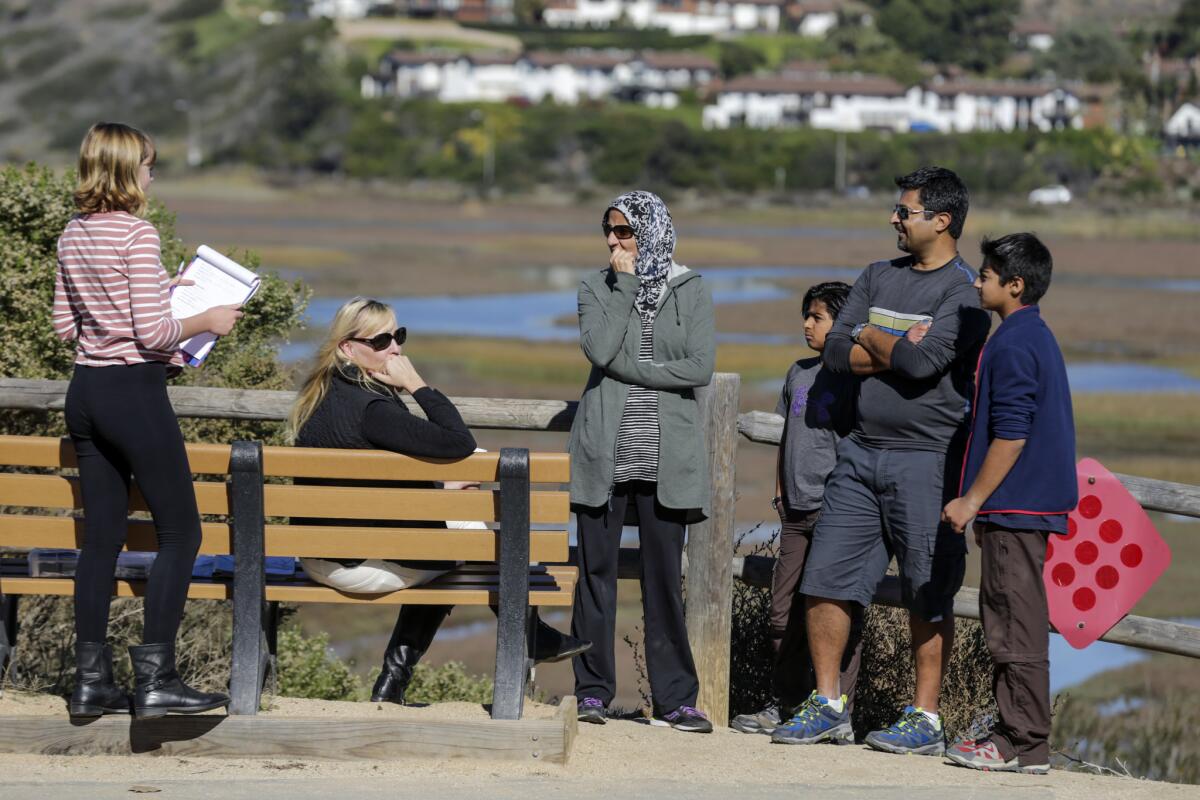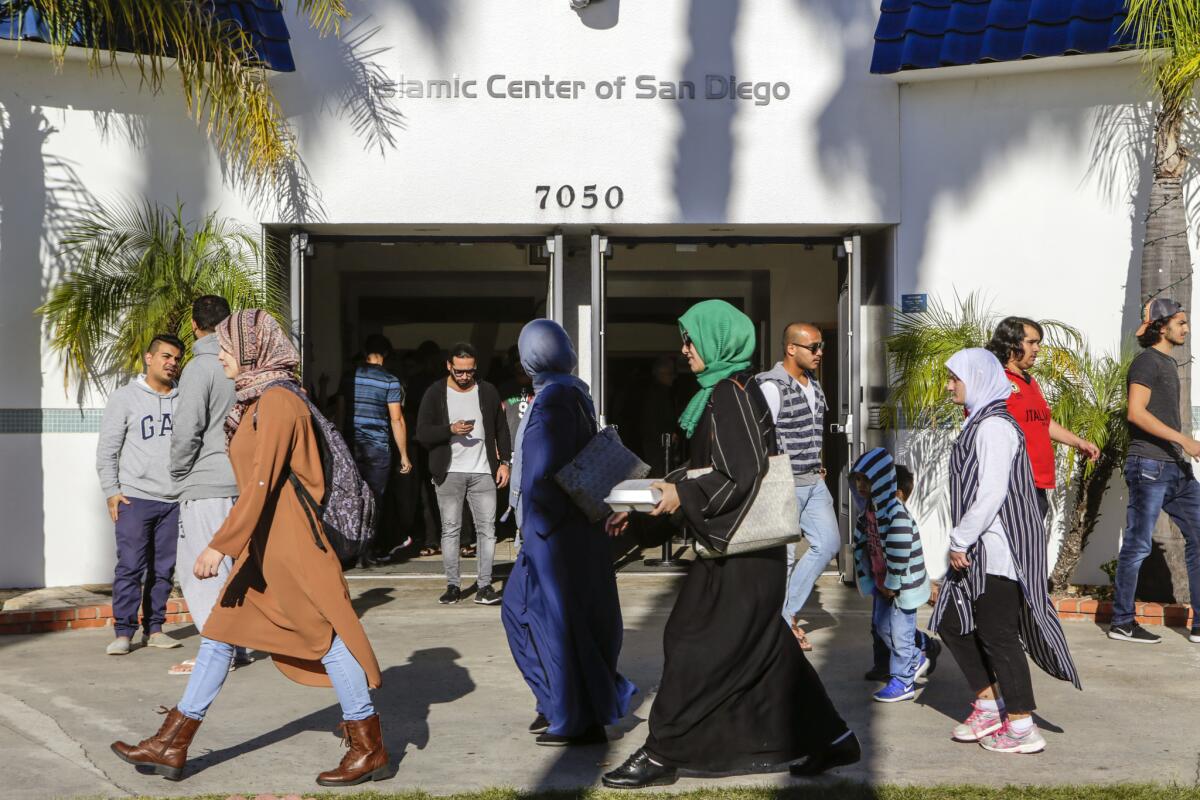As Inauguration Day nears, Muslims wonder whether Trump’s tough talk will turn into action
- Share via
Reporting from San Diego — Aisha Shafi stuffed pens and notebooks into her sons’ backpacks and buzzed around her San Marcos home as she made sure the boys were ready for the new school year.
When she stepped through the door, her husband offered a suggestion: “Maybe you shouldn’t wear your hijab today,” he said.
Shafi was the mom carpooling the neighborhood kids to school that morning. She slid the scarf off her head and threw on a baseball cap from her husband’s alma mater, the University of Kansas.
She loaded her boys, 9 and 12, into the car and then, as she passed the first stoplight, draped her hijab back over her hair, angry at herself for being scared.
As the days crawl toward the inauguration of Donald Trump, many Muslims across the U.S. anxiously wonder how much the president-elect’s tough-talking rhetoric will be matched by legislative actions.
Even in liberal California, home to about 500,000 Muslims in its southern regions alone, there is a lingering worry that Trump has conjured something through his words that as president he won’t be able to control.
“I’m really concerned that Trump has brought out something that was maybe hidden before,” said Shafi’s husband, Majid Mahmood. “The hate is just out now, especially when you see an increased rate of hate crimes against Muslims.”
In November, mosques across California received letters threatening genocide and referring to Muslims as “vile and filthy people.” A San Diego State student wearing a hijab was robbed by two men who made comments about the president-elect and Muslims. Across the country, there has been an uptick in reported incidents against Muslims, some rising to the level of crimes.
On the campaign trail, Trump promised to track Muslims coming into the U.S. and require them to register. His promise to ban Muslim immigration was popular among many of his supporters during the GOP primary.
In recent months, however, Trump has suggested he would revise that plan to focus on people coming from countries linked to terrorism, rather than use religion as a criterion.
But the president-elect’s Cabinet picks and members of his transition team have caused some Muslim leaders to worry about the road ahead.
Trump’s choice for national security advisor, Lt. Gen. Michael T. Flynn, has said he believes acts of terrorism by Muslims are rooted in mainstream Islamic faith and once tweeted that “fear of Muslims is rational.”
Kansas Secretary of State Kris Kobach, who has been selected to join Trump’s immigration policy transition team, accidentally revealed his plan for a border wall and tracking immigrants in November. That plan promoted “extreme vetting” of “high-risk” immigrants, including questions about supporting Sharia law, jihad, gender equality and the Constitution.
And Carl Higbie, a prominent Trump supporter, has cited the internment of Japanese Americans during World War II as a legal justification for creating a national registration list for immigrants.
According to researchers at Cal State San Bernardino, anti-Muslim incidents accelerated after the December 2015 terror attack in that city.
“That context is amping up concerns that have existed previously,” said Brie Loskota, executive director of the Center for Religion and Civic Culture at USC. “These are things people have always been concerned about, but those things have hit an all-time high from what I have been able to see.”
Feelings of vulnerability have deep roots in the Muslim community, Loskota said, and those fears have sparked online groups like “Support Your Muslim Neighbors in America” on Facebook.
“If you talk to older Muslims, they will talk about 1979 with the Iran hostage crisis and Iranian Revolution. That brought to the fore this feeling of being other, or liable for things that happen outside of your control,” she said. “With each political moment or international crisis, there is a turning up of the heat or the pressure under which the Muslim community in America exists.”

Tina Hossain’s family emigrated from Bangladesh because they wanted her to have more educational opportunities and a better career than she would have had as a woman growing up there. Now, she worries her religious identity could be a barrier to future opportunities.
“I’ve often heard that the African American community has conversations with their sons and daughters,” Hossain said. “But in my family, even after 9/11, we didn’t need to have those.”
The discussions began on election night, as Trump’s surprising victory slowly became inevitable. In the family text message group, her parents warned of being out in public once the win was official.
Her family decided to have a talk with her brother, a student at UC Santa Barbara. Walk away from any conflict, they told him.
“It is difficult to prepare yourself to be the victim,” Hossain said. “I think it’s really frustrating for him.”
Hossain used to think that hate crimes were concentrated in communities far from home — places where few had the opportunity to interact with Muslims firsthand.
“Even in such a diverse community, it’s not hard for people to be unaccepting of others,” she said.
Many women who wear the hijab feel their decision to don a headscarf in public has made them a target.
When Mejgan Mahmoody shopped at Walmart one recent weekday, she walked by a woman who gawked at her and whispered under her breath that she should “take that thing off your head.”
She wonders whether those encounters will become more common under Trump’s presidency.
“At the end of the day, it’s my choice,” Mahmoody said of her hijab. “It’s a wide misconception that all Muslim women are made to wear the hijab.”
Mahmoody covers herself because she believes it is “in God’s order,” she said, not because a man told her how she should dress.

Norah Sarsour worries that her 3-year-old daughter, Jaden, will grow up in an environment more caustic than what she encountered as a teenager post-9/11.
She remembers walking with her head down in high school and keeping disclaimers ready in the back of her mind in case she needed to show that she wasn’t the same as a Muslim who would fly a plane into a building.
“I don’t want my daughter to have to constantly prove herself,” Sarsour said.
Sarsour, who lives in the Inland Empire, said she hasn’t seen much open racism, though she feels like a certain spirit has been encouraged. She has seen more trucks fly Confederate flags.
On a busy holiday weekend at a mall, she said, a woman shouted, “In America, this is how we park,” at an Asian man.
“Now, I feel like people think they have that space to say those things,” said Sarsour, 29. “This mentality of sniffing out good and bad Muslims has escalated into people taking things into their own hands.”
To avoid conflict, she stops speaking Arabic with her daughter when people start to stare. She does not wear the hijab.
Since the election, Shafi’s family has considered tinting the windows of their cars to avoid being targeted for their appearance. They’ve discussed how to brush off racial or religious slurs to avoid a fight.
Hiking around the wetlands of San Elijo Lagoon with her family on a recent afternoon, Shafi, 41, said she wished people afraid of Islam would get to know Muslims. They would realize that there are more commonalities — in their dreams and aspirations — than there are differences.
Shafi is a Cub Scout leader. Her sons, Umair and Haseeb, like to play outside and climb rocks like many other American boys. Umair wants to scale Mt. Everest when he grows up.
She struggles over how frank to be with her children about what some people think about Muslims. She has enrolled in a self-defense class, and reflects on the limits of turning the other cheek.
“I have the same hope that any other person has,” said Shafi, who was born and raised in the U.S. “I have the same dream for my kids to succeed, to raise a family, to not live in fear.”
That’s why they live in America, she said, and not anywhere else.
For more California news follow me on Twitter: @sarahparvini
ALSO
Next phase of the Wilshire subway receives $1.6 billion in federal funds
Republicans offer no plan to repeal Obamacare as more party members express concern
More to Read
Sign up for Essential California
The most important California stories and recommendations in your inbox every morning.
You may occasionally receive promotional content from the Los Angeles Times.











